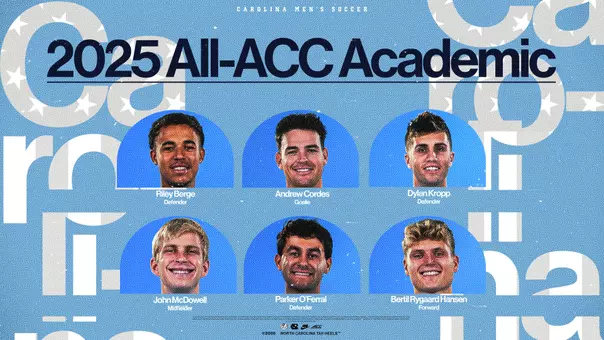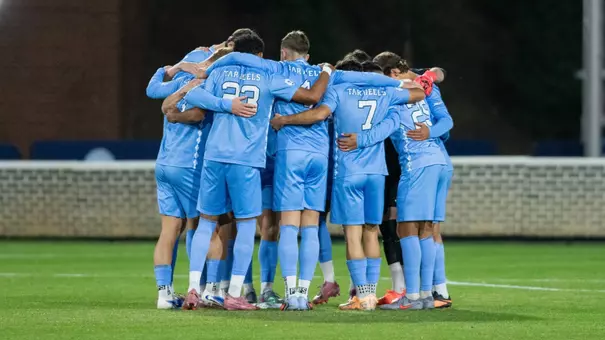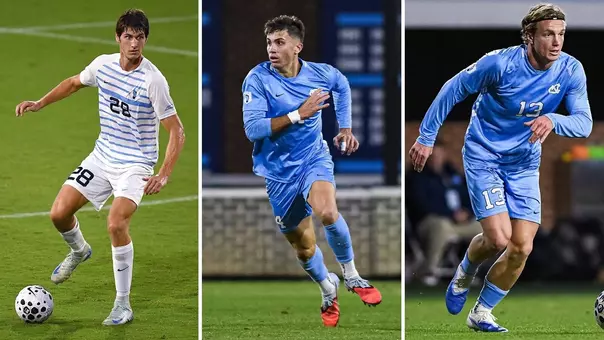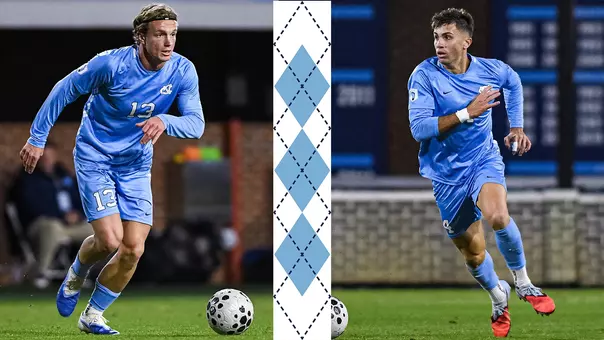University of North Carolina Athletics
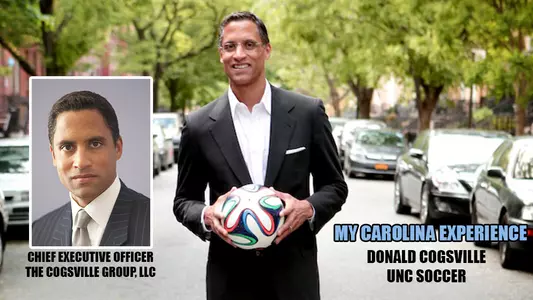
My Carolina Experience: Donald Cogsville
October 8, 2014 | Men's Soccer
My Carolina Experience: Donald Cogsville
By Zoya Johnson, GoHeels.com
When asked about Donald Cogsville, Tar Heel women's soccer coach Anson Dorrance had nothing but praise to give. From his stature to his work ethic, it seems Cogsville was a no brainer to recruit. That's something Dorrance did in the mid-1980s when he piloted both the men's and women's programs at the University for a period of 11 years.
Cogsville, a New Jersey native came into the men's soccer program as it was building and left it with an ACC championship ring and an NCAA Final Four appearance to his credit.
"The thing I loved about Donald is there wasn't any aspect of his life that he didn't use to build his future. I think his experiences here contributed to his success but certainly everything he's done comes from within," Dorrance says. "Those of us who were privileged to be a part of his life just celebrated all of his achievements. Athletically he was special, and if that built his confidence to do other things then there's another sales piece for why athletics should be a part of the university system
"I'm sure his experience here was good, not just because of his soccer participation, but because this is just an absolutely wonderful school. I think what he left UNC with is the same thing we all leave UNC with; an incredibly well-rounded education where athletics is a part of it. The adversities that any athlete experiences is what Donald experienced and then spun into gold."
The adversity that Dorrance mentions is something Cogsville used to drive him throughout his entire life. In fact, one of his first experiences with it came in the form of rejection from an all-star soccer team at the age of 12. Cogsville. "Rejection, is something that every young person must learn to cope with. The experience taught me how to put rejection into a different light and how to use it as a learning experience to get better next time," says Cogsville. "It's something I use every day in business, each experience, positive or negative."
From that first experience on Cogsville learned to turn facing adversity into an advantage. He became a leader at every level of the game prior his Carolina Experience and expected to do the same coming in.
"The focus was to continue to try to develop and be the best I could be and to try to embrace the new experience. My mother passed away two weeks before I got to Carolina but the deep relationships I was forming with such a wide range of students really helped fill the void."
Athletically, the goal was to try to be a productive member of the team and ultimately become one of its leaders. It was an interesting challenge to go from high school to such a top-notch athletic situation. Academically, it was really the same thing, to try and get as much as I could out of the experience and really try to understand what it was I was going to be interested in. It was the first time I really had to start to focus on something specific and with both it was trying to understand where I could find the balance."
Cogsville found his balance as versatile performer on the field, playing both as a defender and striker and eventually earning the captaincy of the Carolina men's team. By the time of his graduation, Cogsville had become one of the all-time leading scorers in Carolina lore and a two year first-team all-ACC selection. He also became the first Tar-Heel to be named to the Men's National Team and was one of the first African-Americans to earn the honor. After completing a degree in communications at Carolina, he went on to earn six caps with the U.S. National Team and then was drafted in the first round by the San Diego Sockers, a Major Indoor Soccer League Team.
Cogsville played two seasons with the Sockers before knee injuries forced him to retire from the sport in 1990. "I was prepared for life after athletics emotionally, and educationally. You have all kinds of adversity when you're in athletics. One of the issues for me was having six knee surgeries. To continue to have to recover, prepare, and go out and compete over and over after those surgeries was helping me build the skill set to go out and compete after my career ended. There's a balance of working hard, being smart and having the right support and mentors, just with a different skill set underlying it. Not much of any of it is rocket science you just have to develop expertise. In the end it's really those basic core characteristics that are always being called upon."
Studying law had always been an ambition for Cogsville. After his retirement from soccer he went on to earn his J.D. at Rutgers University. He feels law school provided him with a broad based understanding of business and served him well as an entrepreneur. After law school, Cogsville became a structured finances attorney at Skadden, Arps, Slate, Meagher & Flom LLP and later became an investment banker with Merrill Lynch's global leveraged finance group. After a successful career on Wall Street, he founded his own private equity real estate firm in 2007, The Cogsville Group LLC.
"After Wall Street it was clear to me that I wanted to do something with all those skills. I wanted to make a difference as an investor in places where I thought we could provide value. It really was a coming together of all of the different experiences. Our mission is to be a leading investor with a culture that supports excellence, and integrity, while providing value for investors. The idea is to be a change agent in the world."
That is exactly what the group is becoming. The Cogsville Group has focused its investment activity on numerous initiatives to revive communities through investment in commercial and residential real estate while working alongside the federal government. In 2009, they won the bidding for the nation's largest subsidized apartment complex. In 2010, the group invested in the second largest bulk sale. This included $1.8B of commercial property, under the FDIC's structured Assets Sales Program. That was the first public-private partnership between the federal government and private investors in which a minority-owned firm had taken stake. The Cogsville Group has invested in five loan portfolios to date from the FDIC with principal balances of $3 billion secured by 4,000 commercial real estate properties in 49 states.
In 2012, The Cogsville Group turned its attention to the nation's housing crisis, acquiring a portfolio of single-family homes in Chicago from Fannie Mae in the nation's pilot bulk sale of Federal REO property. Working in partnership with Fannie Mae, the firm has invested in the U.S. housing economy, which can only mean a continued effort to bring value to undervalued areas across the nation.
Though Cogsville has become invested in the continued growth of his company and its efforts there are two things, aside from his family, that he still finds time for - soccer and UNC.
"I love the sport of soccer. I really want to see it in more urban communities like the one I grew up in and start to bring in more people of color. It's challenging because of the space requirements but it's a challenge that is worthwhile due to the connection to the world. I've gotten involved with the FC Harlem Lions and what I think is a renaissance for the sport in America. I think soccer in Harlem is an opportunity to show how it's done and have it be replicated around the country. The leadership in the organization has been able to build the type of board to help that happen and see it blossom in all urban environments."
A quarter century after graduating from UNC, Cogsville continues to show love and support of his alma mater. Through his involvement with the Board of Visitors he has continued to see the willingness of many amazing people who want to give back to the university. He notes that this willingness and desire to give back is due to the connections they were able to make through their experiences on campus and that they still feel to this day.
These connections are based in what Cogsville calls, "a sort of cradle to grave community that keeps giving long after you've left Chapel Hill. The experience at Carolina is like a family and trusted old and new friends. It's just provided a real universe of connectivity. The breadth and depth of the university is such a rich ecosystem that allows you to grow in your own unique form. The university itself has evolved over many years so it's no wonder that it's allowed folks like myself and countless others to go out and become who they are. Just look at the well rounded citizens that it's produced in all facets of our world.
"Ultimately, what I've found is Carolina is a unique place in that it has a lot for a lot of people. Each student's experience is going to be different but across the board I implore anyone here to try out some clubs and take full advantage of all that is being offered here. It's so vast that it takes some time to understand, but try to take as much as you can from your experience and give as much as well. And of course, have fun, take risks, and make connections."




